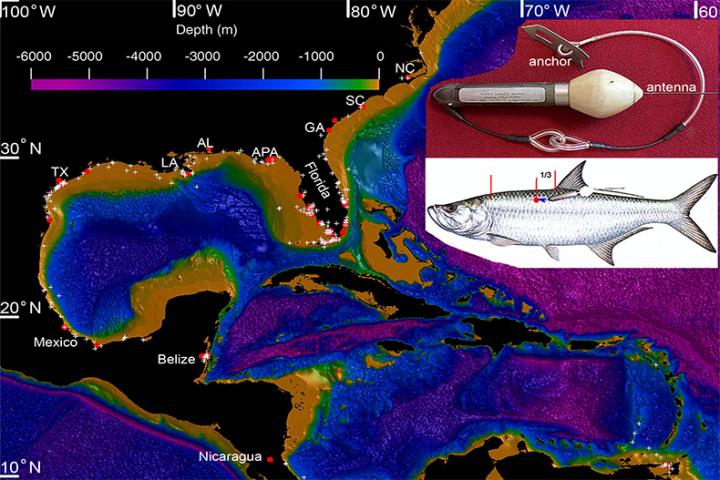Results from 18-year study details long-distance migration, habitat preferences

Credit: Jiangang Luo, research scientist, University of Miami Rosenstiel School
MIAMI–The results of an 18-year study of Atlantic tarpon by scientists at the University of Miami (UM) Rosenstiel School of Marine and Atmospheric Science revealed that these large silvery fish take extensive seasonal migrations–1,000s of kilometers in distance–beyond U.S. borders. The new findings can help protect the fish, which is listed as vulnerable by the IUCN–International Union for Conservation of Nature, and the main draw of a more than $6 billion catch-and-release sport fishing industry in the United States.
Using electronic satellite tags, the UM research team tracked nearly 300 Atlantic tarpon (Megalops atlanticus) in coastal waters of the western central Atlantic Ocean, Gulf of Mexico and Caribbean Sea, including as far away as Mexico, Belize and Nicaragua. The results showed that the mature tarpon make extensive seasonal migrations along a warm, seasonally moving ocean-water feature known as the 26o C isotherm where temperatures remain constant. They also found the fish use both freshwater and estuarine habitat throughout their life and identified several previously unknown spawning locations in Florida and the Gulf of Mexico.
“Our findings show that there is international connectivity in the U.S. multibillion-dollar recreational tarpon fishing industry,” said Jerry Ault, UM Rosenstiel School professor and a co-author of the study. “This is of great importance to anglers and scientists alike to better understand and protect this valuable–and vulnerable–fish and the people who rely on it.”
Atlantic tarpon, known as the Silver King, are considered one of the greatest saltwater sport fish due to their size and spectacular fighting ability. They can reach up to eight feet (2.5 meters) long and weigh up to 355 pounds (161 kilograms), with an average speed of 35 miles per hour.
While tarpon fishing is predominately catch-and-release in the United States, subsistence and commercial harvests of tarpon occurs in many other countries. Sport fishing for tarpon is also very popular in other countries.
Despite the history and importance of recreational catch-and-release fishing for tarpon in the U.S., Atlantic tarpon are now threatened throughout their range by recreational fishing release mortality, directed commercial harvests, intensive harvesting of key prey species, and habitat degradation, said the scientists.
“A myriad of professional charter boat captains in the Florida Keys rely on tarpon fishing bookings as their principal source of income,” said the study’s lead author Jiangang Luo, a research scientist at the UM Rosenstiel School. “If the tarpon population declines, or alters their migration patterns due to climate changes, it would significantly affect lives and livelihoods in Florida and beyond.”
Using the 18-year dataset, the researchers also found that shark predation on tarpon is more significant than previously known across the southeastern United States, Gulf of Mexico, and northern Caribbean Sea.
###
The study titled, “Migrations and movements of Atlantic tarpon revealed by two decades of satellite tagging,” was published in the Jan. 2020 issue of the journal Fish and Fisheries. The study’s co-authors include: Jiangang Luo, Jerald Ault, Bruce Ungar, Steven Smith, David Mangum, Russell Kleppinger and Angel Requejo from the UM Rosenstiel School; Michael Larkin and Nicholas Farmer from NOAA Fisheries; Thomas Davidson and Aaron Adams from the Bonefish Tarpon Trust; David Bryan from the Pacific States Marine Fisheries Commission, Scott Holt from the University of Texas; A. Scott Alford from the International Tarpon Conservation Organization; Robert Humston from Washington Lee University; Adam Marton from Fieldworkers Club and Julian Robertson from the Robertson Foundation.
Support for the study was provided by National Science Foundation (grant EAR-1204752) and many private donors including: the Robertson Foundation, Bonefish Tarpon Trust and Buchanan Family Foundation.
About the University of Miami’s Rosenstiel School
The University of Miami is one of the largest private research institutions in the southeastern United States. The University’s mission is to provide quality education, attract and retain outstanding students, support the faculty and their research, and build an endowment for University initiatives. Founded in the 1940’s, the Rosenstiel School of Marine & Atmospheric Science has grown into one of the world’s premier marine and atmospheric research institutions. Offering dynamic interdisciplinary academics, the Rosenstiel School is dedicated to helping communities to better understand the planet, participating in the establishment of environmental policies, and aiding in the improvement of society and quality of life. For more information, visit: http://www.
Media Contact
Diana Udel
[email protected]
305-421-4704
Original Source
https:/
Related Journal Article
http://dx.




